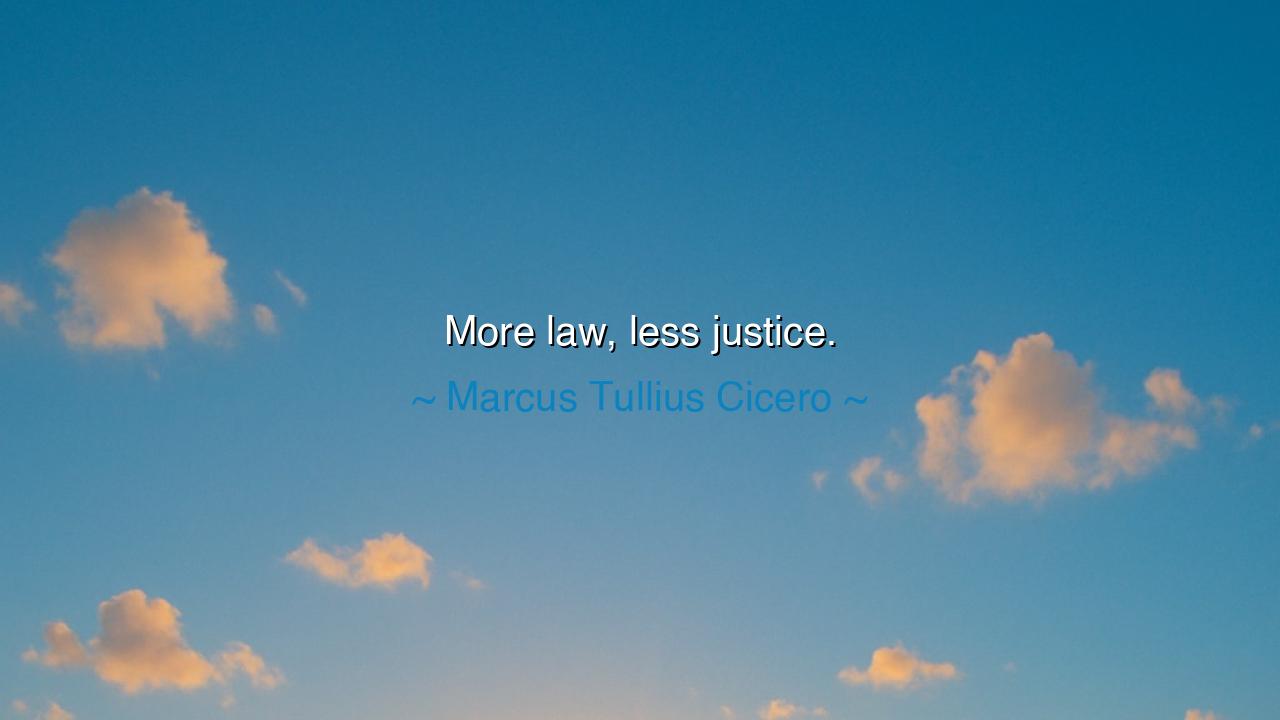
More law, less justice.






The words of Marcus Tullius Cicero, “More law, less justice,” fall upon the ears like a thunderclap of warning from the ancient world. They speak of a paradox: that the very thing created to safeguard fairness can, when multiplied without wisdom, become the very instrument of injustice. Cicero, statesman, orator, and philosopher of Rome, uttered these words not as idle observation, but as a lament of a man who saw the power of law twisted by ambition, greed, and bureaucracy. He knew that when laws multiply without end, they bind the people not in freedom but in chains.
The origin of this declaration rests in the twilight of the Roman Republic. Cicero, who lived through corruption, civil war, and the rise of Caesar, witnessed firsthand how laws could be wielded not to serve the people, but to cloak tyranny in legitimacy. Rome, once guided by the noble simplicity of its Twelve Tables, grew entangled in endless decrees, edicts, and manipulations of legal language. Each new law, instead of clarifying justice, often obscured it, creating loopholes for the powerful and burdens for the weak. Thus Cicero warned: when law becomes excessive, it ceases to protect justice and begins to smother it.
History offers a vivid example in the decline of the late Republic. The Senate and magistrates passed law after law to secure advantage for factions and to enrich their allies. Powerful men, like Sulla and later Caesar, cloaked their ambition under the veneer of legality, issuing reforms and edicts that appeared lawful yet crushed the old liberties of Rome. What was meant to be the shield of the people became the sword of oppression. In this, Cicero’s lament rings true: more law had not brought more justice, but less.
Yet his words reach beyond Rome into every age. For what happens when laws multiply without wisdom? They confuse rather than clarify. They create distance between the spirit of justice and the practice of justice. In modern times too, we have seen courts clogged with endless statutes, technicalities, and loopholes, where those with wealth and cunning can manipulate the system, while the poor stumble in confusion. The heart of Cicero’s teaching is that justice is simple, rooted in fairness and truth, but law, when overgrown, can obscure this simplicity like weeds choking a garden.
The teaching is not that law is evil—Cicero himself upheld law as the foundation of civilization—but that law must remain in harmony with justice. Law is the form, justice is the spirit. When the form multiplies without the spirit, the shell hardens, and the living essence is lost. Just as medicine becomes poison when taken to excess, so too does law become injustice when it grows beyond measure, disconnected from truth.
The lesson for us is clear and enduring: do not measure justice by the number of laws, but by the fairness of their application. Let laws be few, but just. Let them be clear, accessible, and guided by the principle of protecting human dignity. And let citizens and leaders alike remember that the spirit of justice must be placed above the letter of the law. For a society that hides behind endless laws but forgets fairness is already walking the road to corruption.
Therefore, live by this wisdom: when faced with disputes, seek not always the letter of the rule, but the spirit of fairness. When advocating for change, demand not endless new laws, but better ones—laws rooted in compassion, equality, and truth. And in your own dealings, let your word and your actions be guided not by loopholes, but by what is right.
So let Cicero’s cry echo through the ages: “More law, less justice.” It is both a warning and a guide. Beware the excess that clouds truth, and pursue simplicity that illuminates it. For true justice lies not in the endless piling of rules, but in the clear light of fairness, carried in the hearts of people who honor justice above power.






AAdministratorAdministrator
Welcome, honored guests. Please leave a comment, we will respond soon